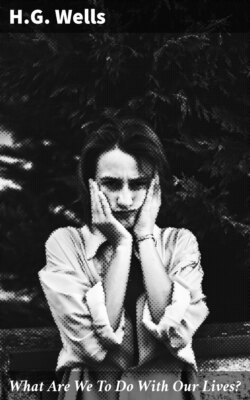Читать книгу What Are We To Do With Our Lives? - H.G. Wells - Страница 5
На сайте Литреса книга снята с продажи.
II. — THE IDEA OF THE OPEN CONSPIRACY
ОглавлениеTable of Contents
I am a writer upon social and political matters. Essentially I am a very ordinary, undistinguished person. I have a mediocre brain, a very average brain, and the way in which my mind reacts to these problems is therefore very much the way in which most brains will react to them. But because it is my business to write and think about these questions, because on that account I am able to give more time and attention to them than most people, I am able to get rather ahead of my equals and to write articles and books just a little before the ideas I experience become plain to scores of thousands, and then to hundreds of thousands, and at last to millions of other people. And so it happened that a few years ago (round about 1927) I became very anxious to clear up and give form to a knot of suggestions that seemed to me to have in them the solution of this riddle of adapting our lives to the immense new possibilities and the immense new dangers that confront mankind.
It seemed to me that all over the world intelligent people were waking up to the indignity and absurdity of being endangered, restrained, and impoverished, by a mere uncritical adhesion to traditional governments, traditional ideas of economic life, and traditional forms of behaviour, and that these awaking intelligent people must constitute first a protest and then a creative resistance to the inertia that was stifling and threatening us. These people I imagined would say first, "We are drifting; we are doing nothing worth while with our lives. Our lives are dull and stupid and not good enough."
Then they would say, "What are we to do with our lives?"
And then, "Let us get together with other people of our sort and make over the world into a great world-civilization that will enable us to realize the promises and avoid the dangers of this new time."
It seemed to me that as, one after another, we woke up, that is what we should be saying. It amounted to a protest, first mental and then practical, it amounted to a sort of unpremeditated and unorganized conspiracy, against the fragmentary and insufficient governments and the wide-spread greed, appropriation, clumsiness, and waste that are now going on. But unlike conspiracies in general this widening protest and conspiracy against established things would, by its very nature, go on in the daylight, and it would be willing to accept participation and help from every quarter. It would, in fact, become an "Open Conspiracy," a necessary, naturally evolved conspiracy, to adjust our dislocated world.
I have thought and written a lot about this Open Conspiracy since first it dawned upon me as being something that was bound to happen in people's minds and wills. I introduced it in a novel called The World of William Clissold, in 1927. I published a little book called The Open Conspiracy in 1928, into which I put what I had in my mind at that time. It was an unsatisfactory little book even when I published it, not quite plain enough and not quite confident enough, and evidently unsure of its readers. It already looks old-fashioned to me now. Yet I could not find out how to do it better at the time, and it seemed in its way to say something of living and current interest, and so I published it—but I arranged things so that I could withdraw it in a year or so. That I have now done, and this present book is to replace it. Since that first publication we have all got forward surprisingly. Events have hustled thought along and have been hustled along by thought. The idea of reorganizing the affairs of the world on quite a big scale, which was "Utopian," and so forth, in 1926 and 1927, and still "bold" in 1928, has now spread about the world until nearly everybody has it. It has broken out all over the place, thanks largely to the mental stimulation of the Russian Five Year Plan. Hundreds of thousands of people everywhere are now thinking upon the lines foreshadowed by my Open Conspiracy, not because they had ever heard of the book or phrase, but because that was the way thought was going.
The Open Conspiracy conveyed the general idea of a world reconstructed, but it was very vague about the particular way in which this or that individual life could be lived in relation to that general idea. It gave a general answer to the question, "What are we to do with our lives?" It said, "Help to make over the New World amidst the confusions of the Old." But when the question was asked, "What am I to do with my life?" the reply was much less satisfactory.
The intervening years of thought and experience make it possible, now, to bring this general idea of a reconstructive effort, an attempt to build up a new world within the dangers and disharmonies of our present state, into a much closer and more explicit relation to the individual "Open Conspirator." We can present the thing in a better light and handle it with a surer touch.
